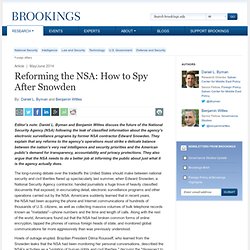

So You Think You're Smarter Than A CIA Agent : Parallels. A group of 3,000 ordinary citizens, armed with nothing more than an Internet connection, is often making better forecasts of global events than CIA analysts.

Here, a man crosses the CIA logo at its headquarters in Langley, Va. Saul Loeb/AFP/Getty Images hide caption itoggle caption Saul Loeb/AFP/Getty Images A group of 3,000 ordinary citizens, armed with nothing more than an Internet connection, is often making better forecasts of global events than CIA analysts. Here, a man crosses the CIA logo at its headquarters in Langley, Va. Saul Loeb/AFP/Getty Images The morning I met Elaine Rich, she was sitting at the kitchen table of her small town home in suburban Maryland trying to estimate refugee flows in Syria. It wasn't the only question she was considering; there were others: Will North Korea launch a new multistage missile before May 10, 2014? Will Russian armed forces enter Kharkiv, Ukraine, by May 10? "I'm just a pharmacist," she said. Better Than The Pros Viktor Drachev/AFP/Getty Images.
Glenn Greenwald On Edward Snowden and Mass Surveillance. So You Think You're Smarter Than A CIA Agent : Parallels. Our Spying Is Better Than Your Spying. POBUDJE, Bosnia-Herzegovina — Mihret Omerovic knows what it is to rebuild.

His village, Pobudje, was burned down 22 years ago when it was taken by Serb forces. He fled with thousands of other Bosnian Muslims to nearby Srebrenica, but then had to flee the worst massacre in Europe since World War II. Omerovic, 35, returned to rebuild his home in 2002. He started a family and began to till the land. But now, following the worst Balkan flood in at least a century, Omerovic's water-logged farm, like those of the mostly agrarian villagers around him, will bear no fruit.
The flooding, wrought by three months' worth of rain falling in only three days, covers a territory larger than the U.S. state of Massachusetts in Bosnia, Serbia, and Croatia. "The physical destruction is not less than the destruction caused by the war," Bosnian Foreign Minister Zlatko Lagumdzija said Monday, May 19, in a news conference. But in addition to the loss of homes and land, other dangers lurk. Reforming the NSA: How to Spy After Snowden. Editor's note: Daniel L.

Byman and Benjamin Wittes discuss the future of the National Security Agency (NSA) following the leak of classified information about the agency's electronic surveillance programs by former NSA contractor Edward Snowden. They explain that any reforms to the agency's operations must strike a delicate balance between the nation's very real intelligence and security priorities and the American public's demand for transparency, accountability and privacy protections. They also argue that the NSA needs to do a better job at informing the public about just what it is the agency actually does. Howls of outrage erupted. Brazilian President Dilma Rousseff, who learned from the Snowden leaks that the NSA had been monitoring her personal conversations, described the NSA's activities as a "violation of human rights and civil liberties," decrying the "disrespect to national sovereignty.
" Read the full article (registration required) » Can Big Data Stop Wars Before They Happen? It has been almost two decades exactly since conflict prevention shot to the top of the peace-building agenda, as large-scale killings shifted from interstate wars to intrastate and intergroup conflicts.

What could we have done to anticipate and prevent the 100 days of genocidal killing in Rwanda that began in April 1994 or the massacre of thousands of Bosnian Muslims at Srebrenica just over a year later? The international community recognized that conflict prevention could no longer be limited to diplomatic and military initiatives, but that it also requires earlier intervention to address the causes of violence between nonstate actors, including tribal, religious, economic, and resource-based tensions. For years, even as it was pursued as doggedly as personnel and funding allowed, early intervention remained elusive, a kind of Holy Grail for peace-builders.
This might finally be changing. To be sure, disappointments are to be expected when breaking new ground. So You Think You're Smarter Than A CIA Agent : Parallels.